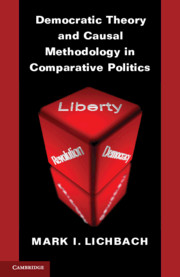Book contents
- Frontmatter
- Contents
- List of Tables
- Preface
- 1 Methodology’s Problem, and Democracy’s Too
- Part I Rationalism and Constructivism
- 2 Where Democracy Is To Be Found and Why
- 3 When Causality Is To Be Found and How
- 4 Two Western Dreams
- Part II State-Society and Contentious Politics
- Part III Conclusions: Three Chapters, Five Themes, and Twelve Theses
- References
- Index
4 - Two Western Dreams
Thin and Thick Democracy
Published online by Cambridge University Press: 05 May 2013
- Frontmatter
- Contents
- List of Tables
- Preface
- 1 Methodology’s Problem, and Democracy’s Too
- Part I Rationalism and Constructivism
- 2 Where Democracy Is To Be Found and Why
- 3 When Causality Is To Be Found and How
- 4 Two Western Dreams
- Part II State-Society and Contentious Politics
- Part III Conclusions: Three Chapters, Five Themes, and Twelve Theses
- References
- Index
Summary
Comparativists try to understand the forces (Chapter 3) behind two different types of “free and rational society” (Chapter 2). Wedeen’s discursive democracy, subject only to its own discourses and performances, has autonomous agency and power. Acemoglu and Robinson’s procedural democracy, a prisoner of its environmental constraints, is subject to economic markets, civil society, political culture, the bureaucratic state, and the world-historical situation. For example, is American democracy a free construction of European political theorists, the result of constitution makers enacting Enlightenment thought? Or is American democracy derivative of its circumstances, the consequences of a settler colony and frontier society with rich natural resources and ocean-delimited separation from the Old World? A pragmatic middle ground holds that the influence of democratic theories is contingent on their adaptations to changing environmental situations. For example, geographic isolation could have permitted political theories from the European Enlightenment to have safely taken root in America.
This chapter connects Chapters 3 and 4. It shows how rational choice’s procedural democracy and its comparative statics jointly produce a dream of thin democracy, and how constructivism’s deliberative democracy and its social constructivism jointly produce a dream of thick democracy. Here’s the rub: both dreams are flawed. The following chapters then turn to Kohli’s and Tilly’s alternatives.
- Type
- Chapter
- Information
- Publisher: Cambridge University PressPrint publication year: 2013

